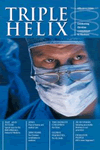We all enjoy a good case report with accurate clinical detail, a problem which is none too easy to solve and, finally, a clear explanation of everything. This short and very readable book has just such reports, as remarkable today as they were at the beginning of the first millennium when it was written.
This is significant because the author, a cultured Greek, who would no doubt have assented to the Hippocratic Oath, did not personally witness much that he describes. However, in his introductory address to Theophilus, an unknown but educated first century Christian, he explains that he had carefully investigated everything from the beginning and had therefore written an orderly account so that Theophilus 'might know the certainty of the things that he had been taught'.
The book is therefore not just an interesting narrative but a book with a purpose, as Luke acknowledges in his second book, the Acts of the Apostles.
Luke refers to his first book as the one in which he described 'all that Jesus began to do and to teach'. Theophilus is to be left in no doubt, either about the works of Jesus, or about the sayings of Jesus, and all that they must mean for his life in the first century as a Christian.
When Luke describes events, he is careful to relate them firmly to the historical events and culture of the time. He recounts precisely, for example, the names of contemporary Roman imperial officials, as if to counter the contentions of subsequent sceptics that it is all a fairy story. As a keen clinical observer and scientist, he carefully describes his methods and the purpose of the book, just as any author of a modern scientific paper would do today.
What sort of person was Luke? His travelling companion, in many journeys through what is now Turkey and Greece, was Saul - later Paul - of Tarsus. This was a man who would be familiar with any potential weaknesses in Luke, but could effortlessly describe Luke as a 'beloved physician'.
Luke must have been a sweet tempered man, concerned for all sorts of people, and profoundly concerned for those who were sidelined and discriminated against in his day. Thus, when his account of the coming and the birth, the life, death and resurrection of Jesus Christ is compared with the two parallel contemporary accounts by Matthew and Mark, Luke distinctively accords a dignity and a remarkable prominence to women. Luke alone relates one of the most famous of all the parables, in which a culturally ostracised Samaritan shows how far he was prepared to go to help a Jewish man who had been mugged and badly beaten up on a road out of Jerusalem. And Luke alone tells the story of the hated and embezzling tax collector, who was prepared to climb a tree in order to see the strange Galilean prophet of whom he had heard so much.
If he shows his radical attitude to the prejudices and exclusions of the society in which he lived, he also shows a touching loyalty to his colleagues. He does not mention, as the other Gospel writers do, how a woman, who had been bleeding for many years, had suffered at the hands of her many physicians!
His clinical alertness throws much light on the perplexing problem of sickness and of demon possession. Luke carefully recounts how people who were brought to Jesus 'had various kinds of sickness' and how they were healed when Jesus laid his hands on them. At the same time he writes 'demons came out of many people, shouting you are the Son of God. But he rebuked them and would not allow them to speak because he was the Christ.'
In one of Luke's unique accounts of some of the women who accompanied Jesus, he is careful to state that they had been 'cured of evil spirits and diseases'. Indeed one of these women is identified both by her name, Mary (called Magdalene), and by the extent of her demon possession - 'seven demons had come out of her'. Luke records how, on a number of occasions, the power of the Lord was present to heal the sick, and the divine authority of the Son of God was sovereign over demons, which recognised this authority and even pleaded to be allowed to go away. These accounts of the recoil of demons from the authority of Christ have a thoroughly contemporary ring to them, whether in countries where a Christian church is just getting established, or within the secular materialism of the West: these same demons still spoil and bind lives, and are still cast out through the authority of Christ.
How should we regard the Gospel that Luke wrote? Is it merely an elegant and historically accurate account of the work and teaching of Jesus, rich in clinical detail, dramatic episodes of healing and of the casting out of demons? Or should it be acclaimed because it is socially radical - both in its assault on the attitudes and prejudices of the time and in the interest and care that Luke shows for those whom nobody cared for, the dispossessed and weak of his world?
It is all this, but it is so much more also. The radical social attitudes are indeed those of the author, but they are derived from the Galilean Jesus, whose life and teaching are the fabric of the book: it is the insistence of Jesus on setting his face towards Jerusalem, knowing that he must be rejected there, that he must suffer a cruel death, which becomes more and more evident as the book proceeds, reaching its climax in his conquest of death.
All this is the truth of which Luke wants Theophilus to be certain, just as Luke would want his colleagues of today to be equally certain.
































